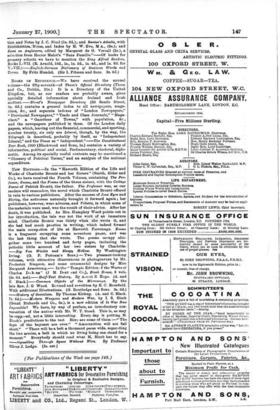NEW EDITION8.—I12 the "Haworth Edition of the Life and Works
of Charlotte Bronte and her Sisters" (Smith, Elder and Co.), we have received the Fourth Volume, containing The Pro- fessor, Emma, and the Poems of the three sisters, with the Cottage Poems of Patrick Brontd, the father. The Professor was, as our readers will remember, the novel which Charlotte Brontk offered in vain to various publishers. After the success of Jane Byre and Shirley, the authoress naturally brought it forward again ; her publishers, however, were adverse, and Villette, in which some of the materials were need, was the result of their advice. After her death, it was published. As Mrs. Humphry Ward points out in her introduction, the tale was not the work of an immature mind. Charlotte Brontii was thirty when she wrote it, and she bad had much practice in writing, which indeed formed the main occupation of life at Haworth Parsonage. Emma is a fragment occupying some seventeen pastes, and was the last thing that she wrote. The poems occupy alto- gether some two hundred and forty pages, including the pathetic little account of her two sisters by Charlotte. —Rip Van Winkle and Sleepy Hollow. By Washington Irving. (G. P. Putnam's Sons.) — Two pleasant-looking volumes, with attractive illustrations in photogravure by Mr. Frederick Simpson, and some ornamental designs by Miss Margaret Armstrong.— In the "Temple Edition nf the Works of Charles Dek. na " (J M. Dent and Co.), Bleak House, 3 vols. (4s. 6d. net).—Half-Text History. By Ascutt R Hope. (A. and C. Black.)—Common Objects of the Microscope. By the late Rev. J. G Wood. Revised and rewritten by E. C. Bousdeld. With additional Illustrations. (G. Routledge and Sons. 3s. 6d.) —History of Socialism. By Thomas Kirkup. (A. and C. Black. 7s. 6d.)—Modern Weapons and Modern War, by I. S. Bloch (Grant Richards and Co., 6s.), is a new edition of Is War Now Impossible? We have, by way of preface, an introductory con- versation of the author with Mr. W. T. Stead. This is, as may be supposed, not a little interesting. Every day is putting M. Bloch's predictions to the test Here are some of them :—" The days of the bayonet are over." " Ammunition will not fall ahort." " There will be a belt a thousand paces wide. separating the two armies, a belt in which no living being can stand for a moment " Everybody should read what M. Bloch has to say.
Signalling Through Space Without Wire. By Professor Oliver J. Lodge. (Eci. net.)


















































 Previous page
Previous page